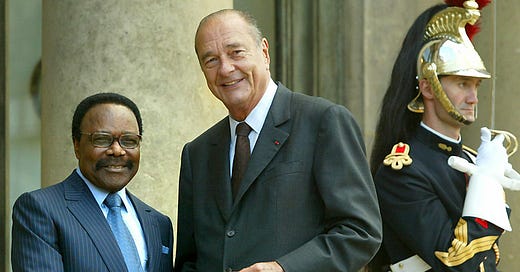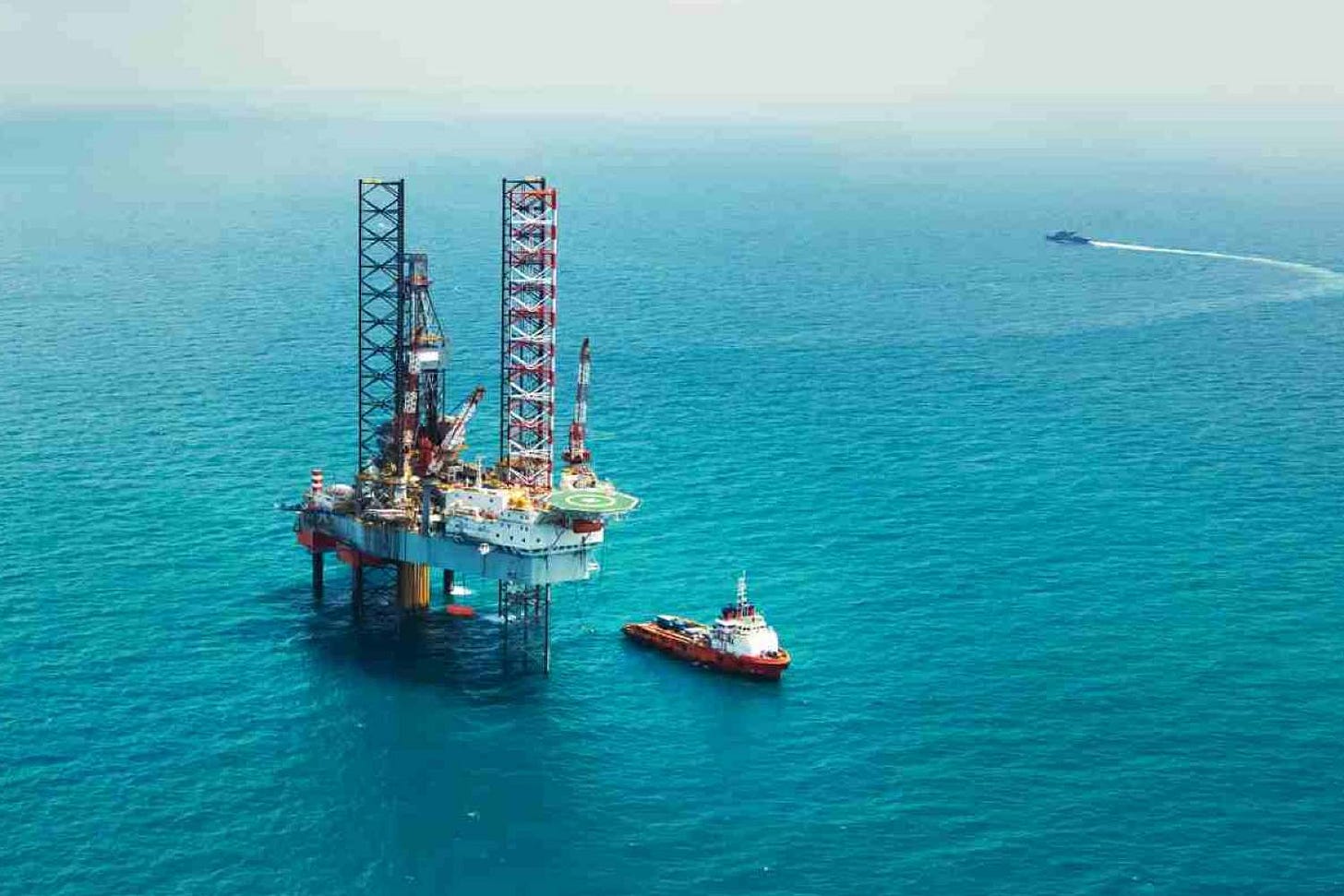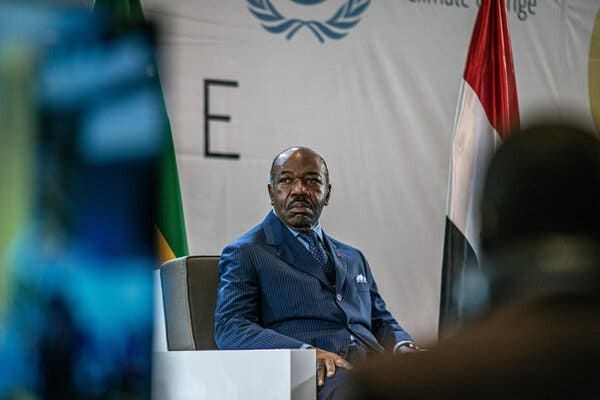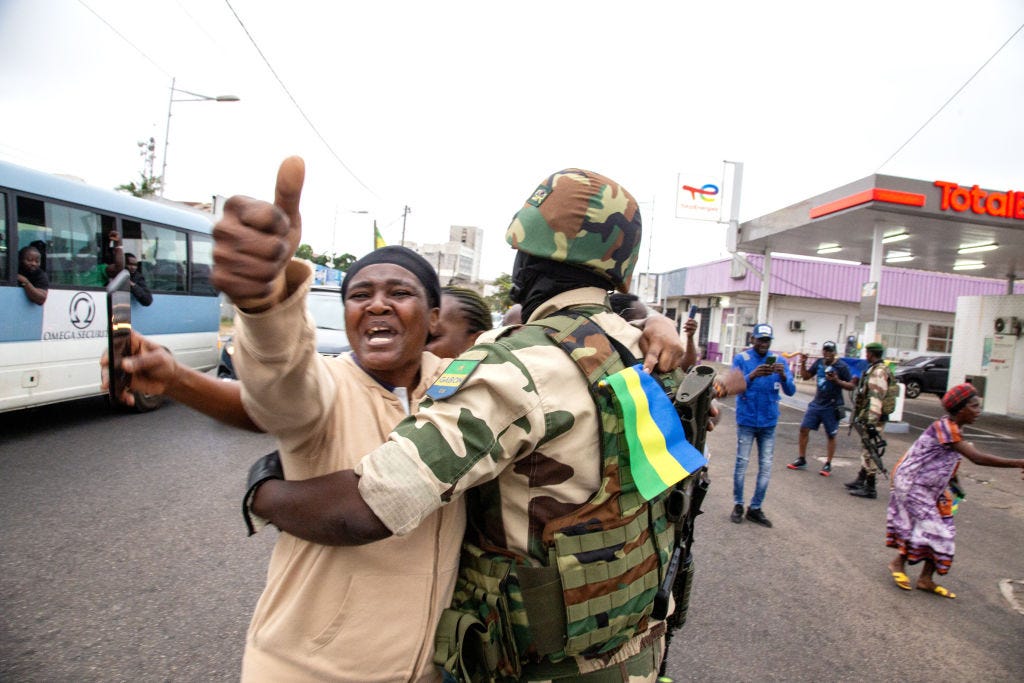Gabon is a Central African country with 2.3M people, 85% of the nation is forest. Its population comprises various tribes including the Fang, who are also found in Cameroon and Equatorial Guinea as well, along with the Myene and Ogooue peoples. Notably, 80% of the country is urbanized, with a majority—60%—residing in two cities, the capital city of Libreville and Port-Gentil.
Gabon is a sparsely populated petrostate that experienced its first successful coup in August 30th, 2023. France had protected Gabonese presidents from coups. While Gabon calls itself a democracy, Gabon is really a “Lineage Autocracy” - the recently deposed president was the son of the previous president who ran the country for 42 years. Even the current putschist is a cousin of the former president.
Gabon is a member of OPEC (Organization of Petroleum Exporting Countries) and is one of the few Sub-Saharan African countries (Besides Botswana, Namibia, South Africa, & Equatorial Guinea) that is deemed upper-middle income by the IMF & World Bank (World Bank’s definition is an average yearly personal income between $4466 to $13,845 USD in 2022 dollars). So Gabon’s ranking is in the same World Bank rank as like Turkey, Malaysia, & Brazil and exceeds such non-EU, eastern European countries with similar population sizes like Belarus, Albania, and Moldova.
Moreover, Gabon boasts nearly “universal access to electricity” (at least 4 hours per day), surpassing South Africa and much of Sub-Saharan Africa in this vital aspect of development.
Gabon’s relative “success” comes from its massive crude oil reserves relative to its population. Gabon’s crude oil reserves per capita is larger than Angola, Nigeria, and Ghana’s combined simply because Gabon has a lot of oil for 2.3M people, while Angola and Ghana’s population is 33M+, and Nigeria’s is 220M. Interestingly, Libya has more oil reserves per capita than Gabon, Angola, Nigeria, and Ghana combined.
While Gabon has achieved notable progress within the context of Sub-Saharan Africa, the nation grapples with persistent challenges. Notably, a military coup on August 30th, 2023, cast a shadow on Gabon's journey, with underlying issues including:
1. Economic inequality: 33% of Gabon lives under Gabon’s national poverty line. In Gabon,10% of the population earns 43% of the national income, making Gabon between Canada and American inequality. Also, the nation’s wealth inequality reports the top 10% owns nearly 60% of the total wealth.
2.Corruption: The significant income & wealth disparity is rooted in the Bongo regime, which governed Gabon for 56 years prior to the coup. This regime established a clientelist, kleptocratic system where multinational oil companies such as Perenco, Shell, and TotalEnergies and pay rents to the Gabon’s government owned oil corporation. This government owned firm is effectively controlled by the Bongo family and his clique, siphoning off its profits to their personal wealth.
Even when Gabon does “anti-corruption efforts” they are corrupt. In 2018, the Bongo family launched an anti-corruption campaign called “Operation Mamba” and “Operation Scorpion” which largely replaced bureaucrats and administrators with other Bongo family members.
3.Youth Unemployment: One of Gabon’s biggest issues, like South Africa and Botswana, is tackling Gabon’s massive youth unemployment issue. 37% of youth(ages 15-24) are unemployed as of 2022.
4.Oil Dependence for Foreign Exchange: Gabon depends selling oil & manganese to grow its economy and gain foreign currency to import food. Gabonese farming is terribly subsistent like most of Africa.
The problem with depending on commodities is that their price is very volatile, take a look an oil prices below:
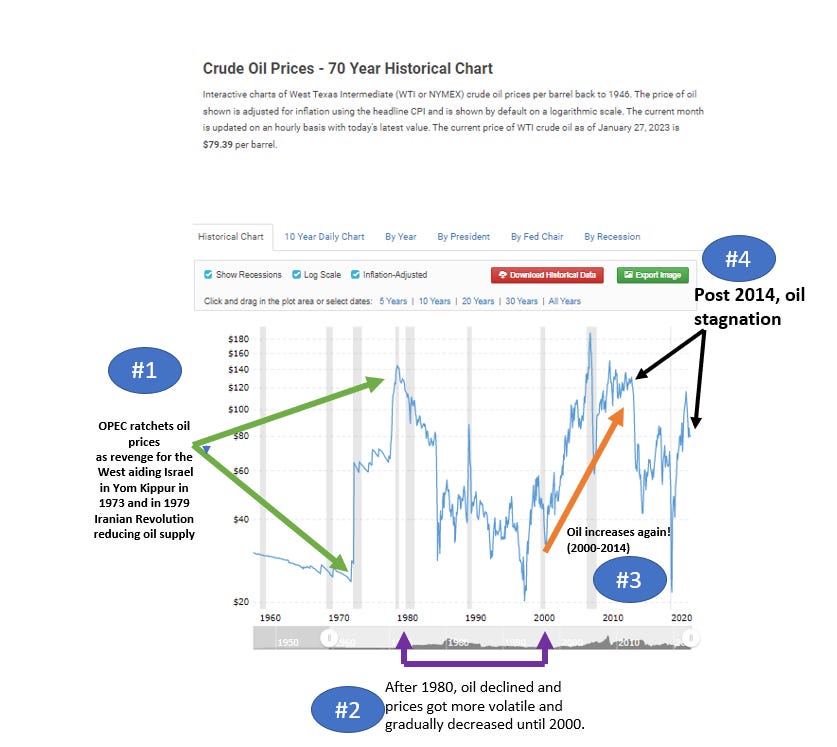
Gabon’s income per capita is dependent on oil prices. Gabon grew from 1960-1981, during the oil nationalization wave when developing countries were nationalizing their oil wealth from Western Oil majors. Gabonese inflation- adjusted incomes peaked in 1981. However, the early 1980s recession in the West & Japan, prompted by Western nations’ central banks raising interest rates, triggered a plunge in oil demand and prices. African countries suffered capital flight, Gabon’s government budget fell & had debt issues, and Gabonese incomes suffered. Gabon took 6 IMF loans between 1980-2000 which came with austerity measures. The 2000-2014 China-fueled commodity boom raised oil prices and Gabonese incomes. But post 2014, with the Chinese economy adjusting to the cooling of their real estate market, and with the U.S.-led shale revolution, oil prices declined which caused a decline in Gabonese incomes again. Below you will see the chart for Gabonese incomes adjusted for inflation in December 2022 US dollars.

Pre Colonialist & Colonialist Era (1839-1960), Super quick
A long time ago, like most countries in Central Africa, it was populated by the dwarf pygmy people until the Bantu people from Nigeria/Cameroon migrated there around the 14th century. When the Portuguese landed in 1470, they called the place “Gabao” which means “cloak”, which is what the estuary of a river near Libreville looks like.
Mpongwe rulers unknowingly signed away their land to the French in 1839. When the French colonized the whole territory, “Gabao” was renamed “Gabon”. By 1910, Gabon became part of French Equatorial Africa. Offshore oil was discovered beyond the capital, Libreville in 1931, and by 1945, it was part of the French Community. It was during this time that France created its currency for French West & Central Africa, and expanded public investment in the infrastructure, healthcare, oil exploration, and education.
The oil made Gabon the second richest colony in the French empire (although it mainly benefited those who lived around the capital).
By 1958, Gabon and other Francophone countries (except Guinea) voted to stay in the French Community.
But in 1960, Gabon received independence, as did many other African nations. However, the first president Leon M’ba did not want independence. He actually lobbied to make Gabon an overseas territory, but failed. Despite this, President Leon made sure that Gabon would be a strongly attached appendage of France.
Leon M’ba (1960-1967)
Leon M’ba, the 1st President of Gabon, initially wanted democracy, but quickly realized the Gabonese were too tribal for democracy to be effective. He quickly became authoritarian who arrested several ministers a few months in his tenure, banned press & political opposition, and was sycophantic towards France.
The country was initially dependent on selling wood, but when it started extracted huge amounts of oil, manganese, and uranium in the 1960s, Gabon massively increased its living standards (actually mainly for the political elites). French petro-firms like Total came pouring in, rapidly transforming Gabon to be the 4th biggest crude oil exporter on the continent and a major oil supplier to France. (If you were ever curious how France became a leader in nuclear power, Gabon is a big contributor. )
In 1964, the Gabonese military attempted to overthrow Leon for dissolving the lower house of parliament, but the French crushed the Gabonese military to keep Leon in power, solidifying a new relationship between the Gabonese President, French business, and the French government. This led to a French military presence and exclusive economic privileges for French firms (e.g. exclusive rights to build major infrastructure in Gabon), all in exchange for protection from potential coups.
When oil prices soar, the country’s income from oil exports also increases. Oil companies in Gabon are mainly owned by the government firm, National Company of Gabonese Petroleum, and its successor, Gabon Oil Company (GOC). GOC holds a majority stake (>50% ownership) in most of the country’s oil production. GOC plays the “oil gatekeeper”, managing Gabon’s oil resources and serving as the nation’s oil ambassador. Foreign oil giants like French Perenco & TotalEnergies and British Shell were forced to establish subsidiaries in Gabon if they wanted to drill oil - Perenco Gabon, Total Energies Gabon, and Shell Gabon are all partially owned by Gabon.
When oil prices soar and oil firms in Gabon rake in profits, Gabon also benefits. As noted before, oil export revenue is taxed and oil profits are paid to Gabon as dividends, providing more revenue for the Gabonese ruler’s family & inner clique, as well as money to build schools, hospitals, roads, and to pay teachers. Unfortunately, Gabon's heavy dependence on its oil industry could spell disaster, as some analysts predict the nation's oil could run dry by the 2050s. Gabon is trying to plan for a post oil scenario.
Nationalizing oil is a two-sided coin: oil revenues bring prosperity but also it’s super easy for state officials to steal the money for themselves. This had made Gabon a kleptocratic nation.
In 1962, French agronomist Rene Dumont noted that “a deputy in Gabon was paid more than a British Member of Parliament and earned in six months as much as the average peasant did in 36 years. As for the Gabonese Presidency, Parliament and Ministers, with all their supposedly useful trips, it probably represents, in relation to the national income of the country, more than the cost to France of the court of Louis XVI in 1788.”
By contrast, in U.S, it’s nearly impossible for state officials to steal profits from a private oil firm like Exxon Mobil. The method that the government can use to take revenue from oil firms is through corporate taxes, but Exxon tries it’s best (very well in fact) to legally reduce its tax liability. In 2021, Exxon Mobil made $276B in revenue, paid $40B in all taxes & duties(only $7B to U.S. Government),and its earnings after taxes & expenses was $23B. In America, corruption is fueled by lobbying instead of siphoning funds from government -owned enterprises.
In 1967, M’ba died, and then an even more autocratic and Francophile took office: his VP, Omar Bongo Ondimba.
Omar Bongo (1967-2009)
Bongo ruled for 42 years, the longest non-monarchial ruler of any country in world history until dying from a heart attack. He quickly made Gabon a one-party state, since he noticed Gabonese democracy dissolved into regionalism & tribalism. With the exception of the impoverished third of the country which don’t live in Libreville or Port-Gentile, he improved the lives of the country. But he extravagantly improved the lives of his inner clique & family. (He owned 33 luxury properties in Paris and Nice worth a market value of $190M). Many of French TotalEnergies executives in their subsidiary, Elf, have been jailed for sending millions of euros to Bongo’s secret bank accounts.
French President Charles De Gaulle and successive Presidents would provide Gabon foreign investment, and supported the Bongo family military support. In return, Gabon remained a French ally against the Soviet Union. Gabon was also a base for French espionage in Africa. Because Bongo ran government owned enterprises that we largely under his control, Bongo, his family, and his clique would be the biggest beneficiaries. Bongo also allied himself with anti-western forces, like Muammar Gaddafi of Libya. In order to get investment from Gaddafi, Bongo became a Muslim and Albert-Bernard Bongo changed his name to Omar Bongo.
By 1973, Gabonese growth exploded due to oil prices rising from OPEC’s embargo on Western countries that supported Israel in the Yom Kippur war and OPEC’s subsequent cuts in production. As a result, oil prices doubled in a couple of months, and Gabon was selling oil to Singapore, Malaysia, South Korea, and other European countries. By 1974, Gabon graduated from low income to lower-middle income. By 1979, again due to the cession of oil production by Iran, a major oil producer, during the Iranian Revolution, oil prices exploded again. Bongo tried to use this opportunity to use oil revenues to expand manufacturing through import substitution. He would use oil profits to subsidize lumber processing, cigarette factories, breweries and other businesses. Most of these businesses collapsed and were inefficient, due to the practice of employing relatives, political mismanagement, and early opening up to foreign competition from IMF advice.
In the mid 1980s, oil prices collapsed and stagnated, Gabon went into a recession and its debt payments became impossible to manage. The oil prices declined even more in the 90s due to the Asian financial crisis which cratered Asian oil demand. Oil prices didn’t recover until 2000. Between 1978 to 2000, Gabon borrowed nearly ~$230M from the IMF, and the IMF forced Gabon to become a multiparty democracy, to reduce government spending, and to sell state-owned corporations in order for Gabon pay its huge debt. Gabon has been failing behind schedule for further privatization of its state owned firms.
In 1990, there were riots in Libreville and Port-Gentil. People wanted higher wages and elections. The riots got so violent that the French brought their military in to protect French firms, French Nationals and Bongo from a coup. After the riots, Gabon made many political changes, including allowing (rigged) elections. In 1994, France devalued the CFA franc which means importing food & goods become more expensive, causing 100% inflation in a year, leading to more riots. Bongo maintained power by bribing political opposition. The opposition leader, Pierre Mamboundou was given $21.5 million in hush money.
In the 90s, Bongo made a Sovereign Wealth Fund in 1998. As of today, it owns nearly $2B in assets under management, with 78% of the portfolio invested in Gabon. By 2000, oil prices soared again and Bongo changed the constitution so he can run for office indefinitely. In 2004, Bongo opened relations with Chinese firms to extract iron and manganese, giving Gabon another export to profit from.
Ali Bongo (2009-Present)
In 2009, Bongo’s son took over after Omar died. Ali was not as subservient to France as his dad and his dad’s predecessor was. He came up with a development plan called “Gabon Emergent” - a plan to diversify Gabon from oil revenue (so far unsuccessful). The results have mainly been for Ali to allow Singapore and India, besides French firms, to make infrastructure deals in the country, and Gabon joined the British Commonwealth in 2022.
In addition, he made a debt-for-nature swap to fund government programs. This is a deal that occurs when a portion of Gabon’s outstanding debt is forgiven or restructured with a lower interest rate/ lower annual payments in exchange for Gabon’s commitment to invest in conservation and environmental protection projects.
In 2016, he won his election with 49.8 to 48.2 of the vote, but the election was widely perceived as rigged. People rioted by burning the parliament building in Libreville. Failed coups were attempted, in 2016 and 2019.
To reduce government bloat & corruption (and to centralize power) he removed many ministerial positions and reorganized portfolios of bureaus. Unfortunately, it was uncovered in 2022, that five of Bongo’s relatives have been charged by France for stealing public funds.
Coup: People were sick and tired of the rigged elections and the oil theft of the Bongo family. In August 30th, 2023, he was deposed right after winning re-election which was full of vote rigging.
However, one thing to notice is that the new President, General Brice Nguema, is a cousin of Ali Bongo.
Conclusion
In summary, Gabon's classification as an "upper-middle income" nation primarily stems from the concentration of oil wealth within the Bongo family, and the majority of the population just resides in just two major urban centers. Unfortunately, a third of the population is neglected and poor. Don’t let Gabon’s relatively high GDP per capita numbers fool you, the country had a coup for a reason.
Sources are hyperlinked!


